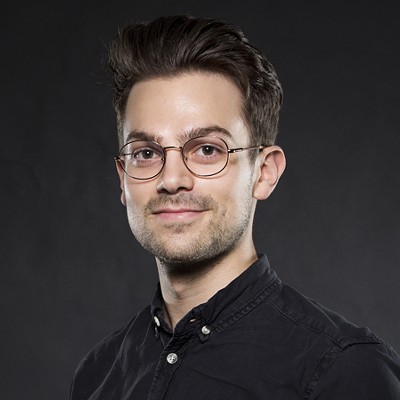By now, if it wanted to, the Palm Beach County State Attorney's Office could have criminally charged
Instead, State Attorney Dave Aronberg announced yesterday that a grand jury will decide whether to charge Raja with a crime, despite the fact that the use of grand juries has become increasingly frowned upon in cases where cops shoot civilians.
Aronberg announced the move during a press conference at 2:30 yesterday. "Normally, we don't announce when we send matters to the grand jury, but in our effort to be as transparent as possible, we are letting the community know," Aronberg said in a statement. He added that the "entire investigation" will be publicly available "once the matter is over."
As cops have increasingly come under fire for shooting civilians, it's surprising that Jones' case has not received more national attention. Jones was a well-known drummer in South Florida, whom friends and family have described as "humble" and "gentle." On October 18, just after 3 a.m., Jones was on his way home from a gig in Jupiter when his car got stuck near the exit ramp for PGA Boulevard off of I-95. At around 2:30 in the morning, Jones called AT&T Roadside Assistance.
But Raja "stopped to investigate what he believed to be an abandoned vehicle," according to a police statement released the day after the shooting. Raja was driving an unmarked car, and maintains that Jones "confronted" him with a weapon, leading Raja to shoot Jones dead. (Raja has since been fired, as he was a newly minted officer at the time, and had not yet passed his probationary period with the department.)
Though a gun registered to Jones was found "between his car and the place his body was found," the Palm Beach Post said investigators determined that Jones never fired the weapon.
The true controversy here lies in Raja's status as a plainclothes officer: Jones' family maintains the drummer had no idea Raja was a cop when the confrontation began. Jones' family has begun pushing more police departments to adopt body cameras.
But it seems less than likely Raja will eventually be charged with a crime, as grand juries are typically more lenient on cops who kill, compared to civilians.
Though a grand jury did choose to indict suspended Broward Sheriff's Office Deputy Peter Peraza in December for shooting a man carrying an unloaded air rifle, that case is something of an outlier. (Peraza's lawyer has since tried to paint the grand jury that indicted his client as biased and untrustworthy.)
The
Famously, a grand jury did not charge former Ferguson Police Officer Darren Wilson with a crime in 2014, after Wilson shot and killed the unarmed Mike Brown. Likewise, a grand jury chose not to indict the New York cops who choked Eric Garner to death on video, either. Both incidents led to two of the most famous civil rights protests in recent American history.
Though statistics on most aspects of officer-involved shootings are hard to find, FiveThirtyEight's Ben Casselman wrote in 2014 that cops tend to be the only people grand juries avoid indicting. "Grand juries nearly always decide to indict," he wrote. "Or at least, they nearly always do so in cases that don’t involve police officers."
Because of this, California became the first state to ban the use of grand juries in
Perhaps the most mind-blowing non-indictment in history came in
The Palm Beach State Attorney's Office did not respond to a request for comment from New Times.
"If the officer cooperates and answers all questions, we then conduct an independent investigation of the shooting and there is the potential for a close-out memorandum to be issued and no charges being filed," Aronberg said during the press conference. "If unresolved issues exist and a close-out memorandum cannot be issued, then our protocol is to take the matter to a grand jury."











